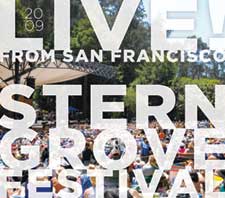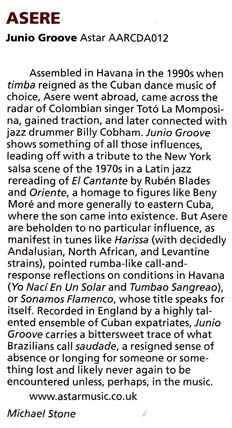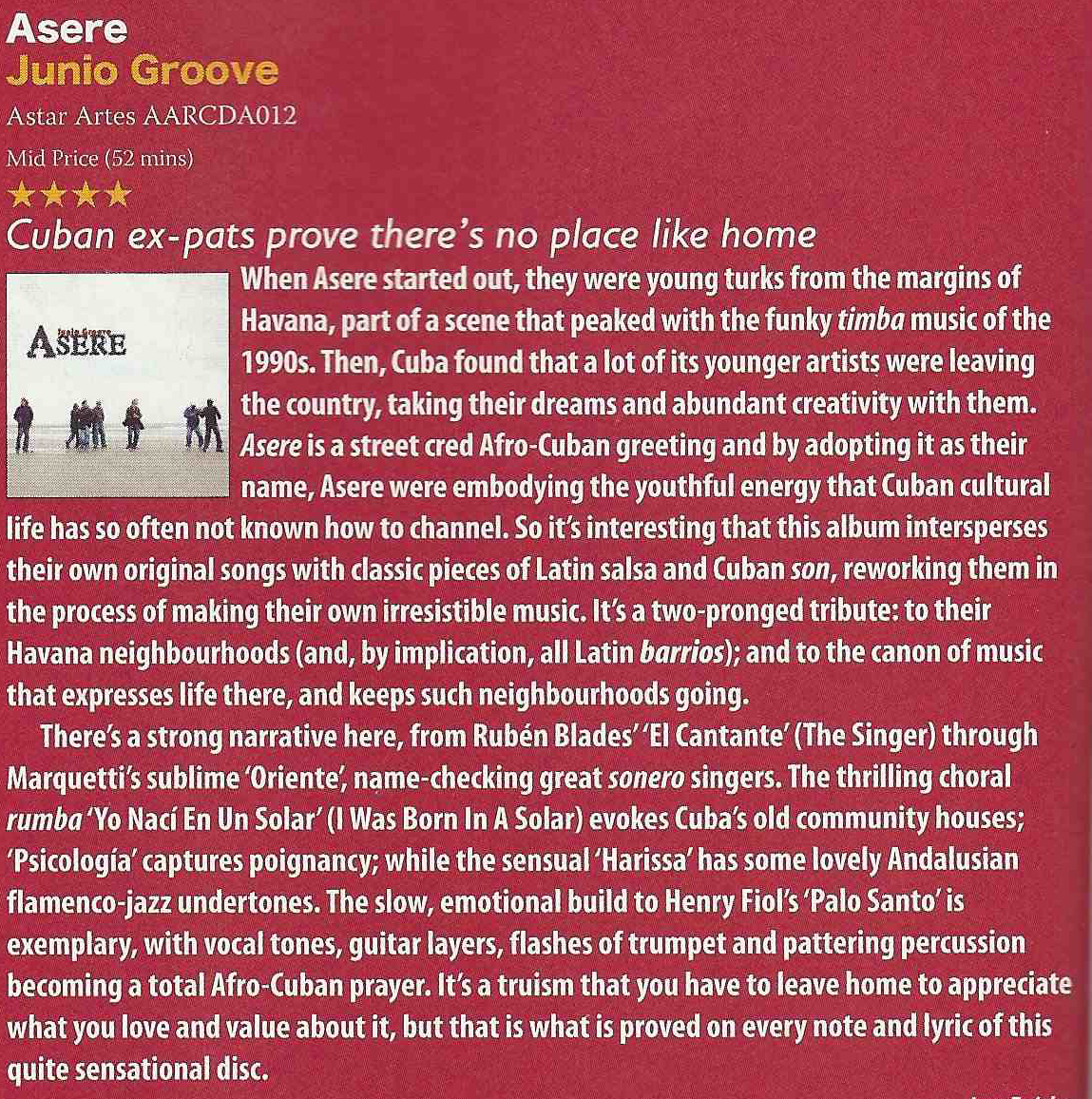Asere Volkskrant review
Despite various changes in line up, Asere still remain one of the most interesting Cuban groups. Ever since the group originated, they aimed to play modern versions of traditional styles, like “son”. Also pop, jazz and other genres have been incorporated – on the latest album of this septet you can even hear a hint of reggae.Familiar elements have stayed, like the clavé, 3/4 – 4/4 measure changes (often indicated by those sticks), and the question- and answergame between singer and group. Left out is the machismo, leaning on clichés of the old ‘septeto’s – even though there are tributes to heroes of the past like Henry Fiol and Beny Moré. Added are beautiful, creative lines for bass, piano and drum, and elaborated refined vocal harmonies – which pays off in a rich mix of sounds. Their musical leader is Michel Padrón. He excels in the instrumental pieces in dialogue with the flexible, flamenco-like guitarplay of Andres Valdés and the crying violin of Alexis Lefevre. This diverse album is a delight for everyone who thinks Cuban music ends with the Buena Vista Social Club.
Toto LatinCom Interview (in Spanish)

To listen to the interview, click in the player below...
Para escuchar la entrevista, haga clic en el reproductor de abajo ...
[audio:http://www.totolamomposina.info/audio/latincom.mp3]LatinCom Interview.
Asere UK tour dates added
The first dates of Asere's European tour have now been posted. Keep checking back for more dates as they are added.
Bodega RootsWorld review
 The somber horns, meandering guitar and tentative drums at the outset of this CD soon shift gears and burst into lively celebration, and once the voice of Totó La Momposina is in the thick of the chorus, all of Colombia's African, indigenous and European roots are joyously entwined. Toto's been the leading lady of Colombian music for some time, always drawing upon traditional sources while maintaining a progressive spirit and vision that has produced such albums as 2001's stunning Pacanto, which was propelled by a contemporary African undercurrent that enriched the music magnificently. La Bodega doesn't quite match the heights of that classic though it similarly builds on a folkloric foundation of drums and vocal blueprints handed down from generations of village cantadoras who lead people in song and often serve as herbal healers as well. Fitting, given the medicinal quality of the music here. Totó La Momposina's lusty singing is nudged to full-blooded heights by an accompaniment of hand drums, small percussion, gaita flutes made from cactus wood, brass, strings and a chorus that shouts approval of her declarations at every turn.
The somber horns, meandering guitar and tentative drums at the outset of this CD soon shift gears and burst into lively celebration, and once the voice of Totó La Momposina is in the thick of the chorus, all of Colombia's African, indigenous and European roots are joyously entwined. Toto's been the leading lady of Colombian music for some time, always drawing upon traditional sources while maintaining a progressive spirit and vision that has produced such albums as 2001's stunning Pacanto, which was propelled by a contemporary African undercurrent that enriched the music magnificently. La Bodega doesn't quite match the heights of that classic though it similarly builds on a folkloric foundation of drums and vocal blueprints handed down from generations of village cantadoras who lead people in song and often serve as herbal healers as well. Fitting, given the medicinal quality of the music here. Totó La Momposina's lusty singing is nudged to full-blooded heights by an accompaniment of hand drums, small percussion, gaita flutes made from cactus wood, brass, strings and a chorus that shouts approval of her declarations at every turn.
An occasional addition of violin, marimba or accordion veers the sound toward such popular Colombian styles as vallenato and the concluding "Fiesta Vieja" winds up the disc on a distinctly cumbia note. Still, a mainly rural sound, not an urban one, guides La Bodega. The album's centerpiece, inspired by the late Colombian master drummer Batata, thunderously demonstrates as much: "Tembandumba" builds like any straight-from-Africa invocation of the Yoruba pantheon, re-connecting Totó La Momposina's homeland to the other side of the Atlantic and resounding with the kind of inspiration heard throughout. This is Afro-Colombian music at its best. - Tom Orr
Bodega Feminist Review
Opening with a brassy, but sentimental horn sound on “Manita Uribe,” the first track of La Bodega bursts into a rhythmic and exuberant potpourri of singing, guitar, and percussion accompanied throughout by a horn section that complements and leavens the sheer joy that comes through on this song. While listening to this album, I was momentarily transported from the wintry Illinois landscape to more tropical climes. The second track, “Margarita,” features Andean/Indian gaita flutes as a backdrop to the chorus and rhythmic drumming that seem to beckon one into a celebratory mood.
If you’re looking for a mood altering experience from your music, La Bodega is just the ticket. Although Totó la Momposina is from Columbia, the third track “Sueño Españo” reminded me of a band you might hear in a Mexican restaurant that stops by your table to serenade you and your dining partner. In “Fidelina,” a strong drum accompaniment is the backdrop for Totó’s strong and feisty singing along with the ever-present brass accompaniment. This is foot tapping, rousing music and reminds us that we’re meant to participate fully in life, not just be passive observers.
La Bodega has been described as “mixed indigenous Columbian and Afro-Latin.” The genre may be less familiar and accessible to listeners than the more familiar urban Latin pop sound that has garnered a worldwide following in the past few decades, but it creates a unique listening experience.
Totó la Momposina is one of the best known singers of this genre. She is a fourth-generation musician from the village of Tallaigua, which is located on the island of Momos, the inspiration for her name. La Bodega would make a great backdrop for a dinner party or any kind of social gathering where you want to lighten the mood and provide a festive and relaxing atmosphere for your guests. If you’re not the party giving type, but have a passion and interest for diverse musical traditions, this is an album that you will want to add to your collection.
Review by Gita Tewari
Toto track on free CD from Stern Grove
 Live! From Stern Grove Festival 2009 is the first CD from Stern Grove where Toto played last summer and features a previously unreleased live track from that show "Aronde Me Meto Yo". It’s only being made available to donors who give $50 or more to support Stern Grove Festival’s admission-free concerts. Spread the word and for more info go to http://www.sterngrove.org/livecd.html
Live! From Stern Grove Festival 2009 is the first CD from Stern Grove where Toto played last summer and features a previously unreleased live track from that show "Aronde Me Meto Yo". It’s only being made available to donors who give $50 or more to support Stern Grove Festival’s admission-free concerts. Spread the word and for more info go to http://www.sterngrove.org/livecd.html
Junio Groove review on The Arts Desk
From
Asere Junio Groove (Astar Records)
By Sue Steward
A clutch of neo-retro son bands - including Asere – thrived during the Buena Vista phenomenon, and rose from Havana’s tourist bars and street parties to globe-trotting tours of Europe. But with the waning of BV, a reinvention away from the aged classics was vital; Asere kept hold of the early 20th-century son style (preserved in Oriente’s correctly trumpet-led version), avoided the spread of electronic Reggaeton, and dug themselves into the countryside of Andalucia, dripping flamenco into their songs in an easy, historically logical liason. "Harissa" (the North African hot sauce equivalent to salsa) goes furthest into that fusion with the lead singer David Echevarria’s tone sharper-than-son sweetness but mild compared to flamenco’s uncontrolled passion; the guitar’s note-bending is unmistakeably oud-like.
Voices are focal here and led by Echevarria and Vicente P Arencibia. Of the nine songs, "El Cantante" (the Singer) causes me problems. Written by salsa singer and poet-songwriter Ruben Blades, and immortalised by the late Puerto Rican salsa icon Hector Lavoe, it is a reminder that intellectual property rights should surround certain songs. There is only one Cantante. Lavoe’s rough, untrained, intuitively sublime countryman’s singing carries the history of the island’s music on every note, while David Echevarria represents the trained and too clean perfection of many young Cuban voices. However – elsewhere - the two men turn in some glorious performances. For the rumba, "Yo naci en un Solar" (I was born in a tenement), Echevarria’s chant-singing and the accompanying male choruses channel us deep into the earthy soulfulness of Afro-Cuban music, accompanied by a low-key bluesy-flamenco electric guitar and surprisingly reserved drumming.
The diversity of this collection reflects the new openness possible today in Cuba. Influence from once-taboo salsa is strong: Ruben Blades’s distinctively nasal, yearning singing style permeates several songs including "Sonamos flamenco", where it effectively merges into a backdrop of gypsy flamenco. "Psycologia" shows obvious influence, in the tremulous moments, from Miami superstar, Willie Chirino – a fact, until recently, unimaginable. These explorations are yielding unpredictable results, and here, work beautifully. Alas, the sleeve offers no information about the songs or musicians, just 11 pages of photographs and two of thanks from the band!
Asere: new live dates in Colombia
We are happy to announce the first Asere shows in Colombia since 1998 ....
Festival Iberoamericano de Teatro, 31st March Carpa Cabaret and 1st April Café de la Comedia
Salsa Camera, 3rd April
Cimarron Radio 3 session
On the 19th March, BBC Radio 3 program "World On 3 with Mary Ann Kennedy" will feature Cimarron in session with an interview and four specially recorded songs. Don't forget to tune in...
Asere free download
Those nice folks at Mondomix are offering "Oriente" by Asere as a free download (and you can buy the whole album there too!).
Go to mp3.mondomix.com/asere to download a pure piece of Cuban style.
Cimarron on Netherlands TV
Recorded during their March 2010 tour of Europe, this was on "Vrije Geluiden" and features Carlos demonstrating the harp and full versions of Cimarroneando and San Rafael.
.
Cimarron Maria Laya EP released
Cimarron have released an EP to coincide with their European tour. This has four tracks taken from the Quitapesares CD (which will only be available during this tour and will not be released in the future) and three bonus live tracks. This EP will only be available for digital download and can be found at most digital music stores. See below for full details and to hear previews of the tracks.
Asere Top Of The World
We have just had confirmation that Songlines have decided to award the Asere Junio Groove album review a "Top of the World" in the next issue. This means they will feature a track on the covermount CD.





